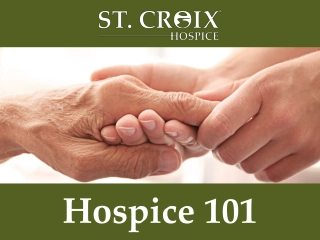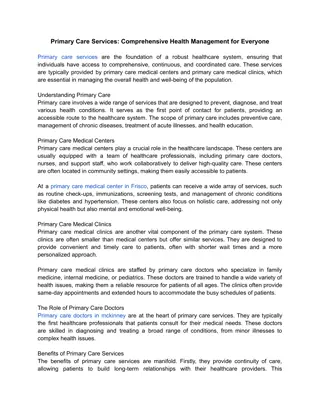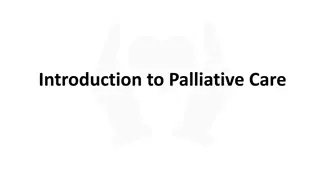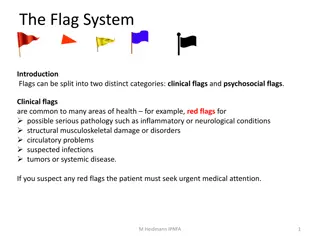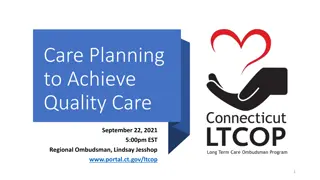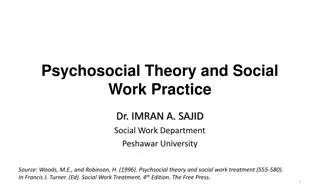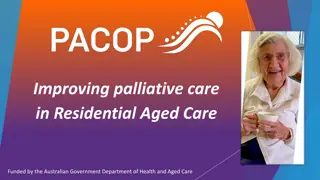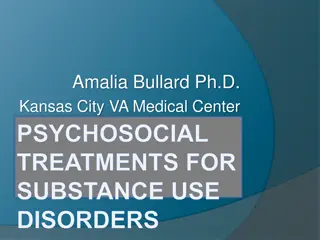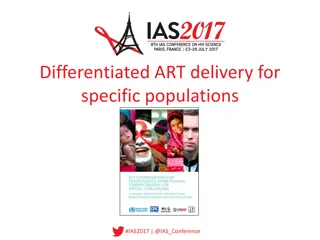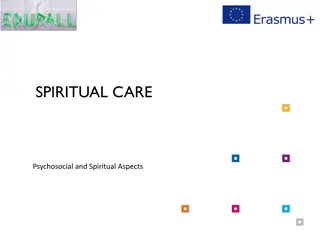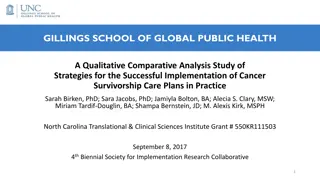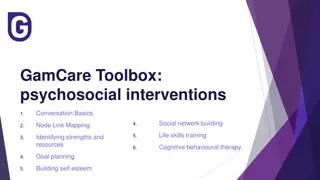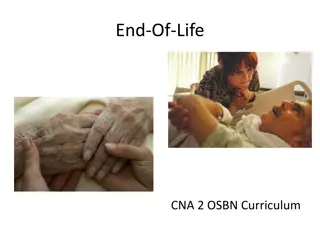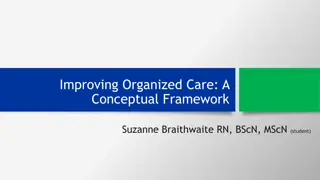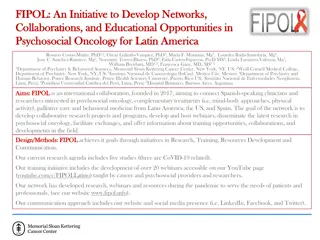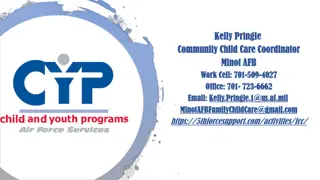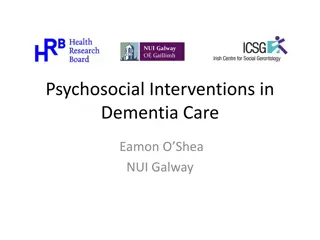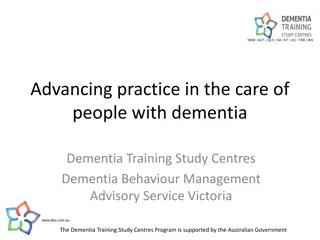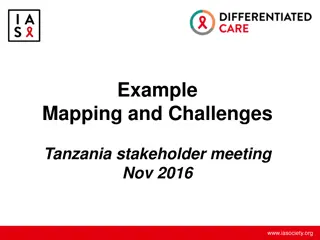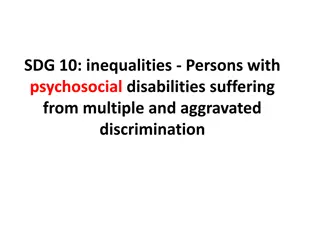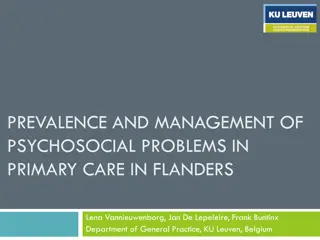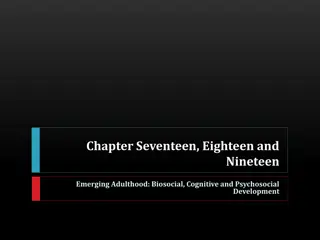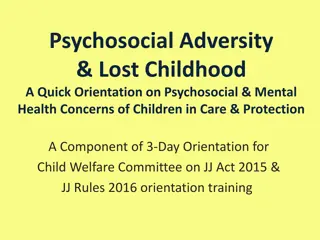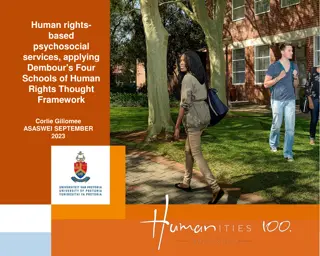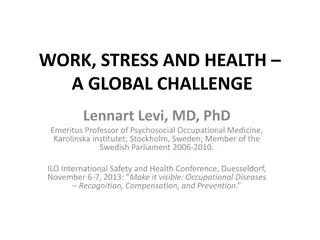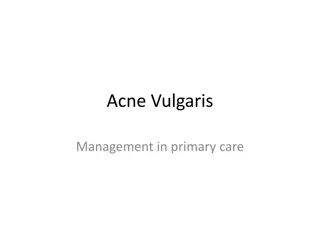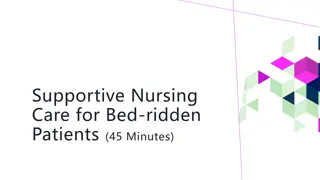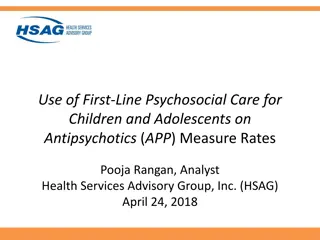Hospice 101
The history of hospice, the benefits it offers, and the care team involved in providing holistic end-of-life care. Learn about the Medicare hospice benefit and the various physical, psychosocial, and spiritual care management services available.
5 views • 28 slides
Understanding and Managing Burnout in Oncology Care: A Path to Better Well-being and Quality Care
In the field of oncology care, the importance of effective management to reduce burnout among healthcare providers is highlighted. Stress, psychosocial risks, and burnout definitions are explored, emphasizing the impact on healthcare professionals' well-being and job satisfaction. Studies reveal hig
2 views • 69 slides
Support and Unity Initiatives by ASSOCIATION FOR THE SUPPORT AND ENCOURAGEMENT OF UNITY CROATIA
Founded in 2014, this association based in Croatia focuses on promoting equality, peacekeeping, demining activities, and social solidarity. Their main activities involve educating civilians on mine dangers, psychosocial empowerment of children, and international experiences with victims of war and v
1 views • 10 slides
Quick MD Care_ Your Trusted Partner in Primary Care Medicine
Quick MD Care: Your Trusted Partner in Primary Care Medicine\n\nWelcome to Quick MD Care, where compassionate primary care meets convenience. We understand the importance of having a trusted partner in managing your health. Our team of dedicated primary care doctors is committed to providing persona
5 views • 2 slides
Primary Care Services: Comprehensive Health Management for Everyone
Primary Care Services: Comprehensive Health Management for Everyone\n\nPrimary care services are the foundation of a robust healthcare system, ensuring that individuals have access to comprehensive, continuous, and coordinated care. These services are typically provided by primary care medical cente
2 views • 2 slides
Understanding Palliative Care: Enhancing Quality of Life in Serious Illness
Palliative care is a holistic approach focused on improving the quality of life for patients and their families dealing with life-threatening illnesses. It involves early identification, assessment, and treatment of pain and other physical, emotional, and spiritual issues. This comprehensive trainin
0 views • 60 slides
The Flag System: Identifying Clinical and Psychosocial Flags in Health Settings
The Flag System categorizes flags into clinical and psychosocial categories, such as red flags for serious pathology and orange flags for mental health issues. Psychosocial flags like yellow, blue, and black identify factors affecting recovery and return-to-work processes. Screening tools like PHQ-2
4 views • 7 slides
Basics of Care Planning for Quality Care in Nursing Homes
Admission to a nursing home requires completion of a baseline care plan within 48 hours, including physician orders, therapy services, goals, dietary orders, and more. Best practices involve involving individuals in assessments, setting attainable goals, and explaining next steps. A comprehensive re
0 views • 14 slides
Understanding Psychosocial Theory in Social Work Practice
Social work practice has always integrated psychosocial concepts to address human well-being and social functioning. Psychosocial caseworkers aim to help clients navigate challenges stemming from environmental imbalances. The term "psychosocial" refers to the interaction of psychological and societa
0 views • 27 slides
Child Care and Youth Programs at Minot AFB
Offering a range of child care services including Child Development Center for ages 6 weeks to 5 years, School Age Care for Kindergarten to 12 years, Family Child Care Program, and Youth Programs for ages 9-18. Services include full-time care, before/after school care, extended duty care, emergency
1 views • 6 slides
Enhancing Palliative Care in Australian Residential Aged Care
PACOP, funded by the Australian Government Department of Health and Aged Care, is a program focused on improving palliative care in residential aged care facilities. It involves standardized assessment practices, early identification of care needs, and a collaborative model for sustainable support.
0 views • 10 slides
Understanding Physical Changes in Old Age and Relevant Theories
Late adulthood, typically starting around age 65, is a period where individuals confront the psychosocial task of integrity versus despair. Geropsychology plays a vital role in studying aging and providing clinical support. Erikson's ninth stage of psychosocial development suggests that older adults
1 views • 14 slides
Psychosocial Treatments for Substance Use Disorders: Strategies and Interventions
Delve into the world of psychosocial treatments for substance use disorders with Dr. Amalia Bullard at Kansas City VA Medical Center. Explore empirical-supported interventions, motivational interviewing, cognitive behavioral therapies, and more to understand the mechanisms of change and the importan
1 views • 91 slides
Priorities and Quality Measures for Type 2 Diabetes Care in NHS GGC
Dr. Kashif Ali leads primary care for Type 2 diabetes, while Dr. James Boyle oversees secondary care in NHS GGC. The data from December 2018 shows the number of Type 2 diabetes patients, their care processes, HbA1c levels, and BMI status. The Diabetes Quality Improvement and Outcome Measures aim to
0 views • 27 slides
Optimizing Antiretroviral Therapy Delivery for Specific Populations
Tailored antiretroviral therapy (ART) delivery models benefit stable patients by addressing inequities and involving key populations. Differentiated care extends to adolescents, pregnant women, and key populations, emphasizing psychosocial support. Transitioning between client categories is crucial
0 views • 6 slides
Child Care Challenges in Kentucky: The Child Care Cliff
Explore the landscape of child care in Kentucky, revealing the challenges families face with the Child Care Cliff. Discover statistics on child care centers, family child care homes, and the average cost of child care in Kentucky. Understand the importance of the Child Care Assistance Program (CCAP)
0 views • 18 slides
Psychosocial Care Training Workshop for Children in Difficult Circumstances
This training workshop focused on understanding children's psychosocial issues, linking child protection with psychosocial care, and developing essential skills for providing supportive care to children in challenging situations. Participants engaged in various interactive learning methods, includin
0 views • 85 slides
Understanding Spiritual Care in Palliative Settings
Exploring the essence of spiritual care in palliative care, this content delves into defining spirituality, its impact on individuals with life-limiting conditions, and the role of healthcare professionals in providing holistic support. It highlights the significance of addressing spiritual, psychos
0 views • 35 slides
Strategies for Implementing Cancer Survivorship Care Plans in Practice
Qualitative Comparative Analysis study aimed to identify effective strategies for successfully implementing Survivorship Care Plans (SCPs) in practice, focusing on key elements such as cancer type summary, treatment recommendations, follow-up guidance, secondary cancer prevention information, and ps
0 views • 25 slides
Psychosocial Interventions in Problem Gambling: A Holistic Approach
Explore the comprehensive framework of psychosocial interventions for problem gambling, including motivational interviewing, cognitive-behavioral therapy, self-esteem building, life skills training, social network building, goal planning, and more. Learn about the core competencies needed for a reco
0 views • 46 slides
End-of-Life Care: Understanding Physical Manifestations and System Responses
End-of-life care focuses on addressing the physical and psychosocial needs of individuals and their families during the dying process. It aims to provide comfort, supportive care, and improve the quality of life in the remaining days. Death occurs when vital organs cease to function, and specific ph
0 views • 15 slides
Understanding Organized Care in Primary Care Settings
Organized Care refers to a natural community of caregivers with a shared commitment to proactive population and individual care management. Through effective and efficient practices, it serves the needs of patients across various settings and over time, with aligned goals and provider accountability
0 views • 18 slides
FIPOL Initiative: Developing Networks & Educational Opportunities in Psychosocial Oncology for Latin America
FIPOL, an international collaboration founded in 2017, aims to connect clinicians and researchers interested in psychosocial oncology in Latin America, the US, and Spain. Through research projects, webinars, and resources, FIPOL strives to advance the field and support patients and professionals, es
0 views • 4 slides
Minot Air Force Base Family Child Care Programs
Offering a variety of child care services including Child Development Center (CDC) for infants to 5 years old, School Age Care (SAC) for Kindergarten to 12 years, Youth Programs for ages 9-18, and Family Child Care Program (FCC) for infants to 12 years. Additional programs include Extended Duty Care
0 views • 6 slides
Understanding Dementia Care: Insights and Challenges
Psychosocial interventions play a crucial role in dementia care, with increasing global prevalence rates and substantial economic costs. In Ireland, the burden of dementia is rising, highlighting the need for effective prevention strategies. Population aging, informal care, and residential care are
0 views • 23 slides
Advancing Dementia Care: Treatment Options and Management Strategies
This content delves into the strategies for advancing the care of individuals with dementia, focusing on treatment and management options. It discusses the role of pharmaceuticals, legal considerations, safety measures, and the importance of avoiding physical restraints in dementia care. Non-pharmac
0 views • 13 slides
Impacts of Marketisation on Home Care for Older People in Urban China
This study by Wenjing Zhang from the University of Bristol delves into the effects of the marketisation process on home care for the elderly in urban China. It explores the rationale behind the marketisation of care, the trends in home care marketisation, and the processes involved. The background s
0 views • 19 slides
Postpartum Care and Physiologic Changes: A Comprehensive Guide
Explore the normal physiologic changes and components of postpartum care, including reproductive and urinary tract changes, gastrointestinal adjustments, cardiovascular modifications, and psychosocial considerations. Learn about managing postpartum issues like hemorrhoids, stress urinary incontinenc
0 views • 11 slides
Challenges and Retention in HIV Care: Insights from Tanzania Stakeholder Meeting
Explore the challenges and retention issues faced in HIV care in Tanzania, as discussed during the stakeholder meeting held in November 2016. The presentation includes data on retention rates, barriers to care, and feedback from field visits and interviews with implementing partners. Insights from E
0 views • 27 slides
Addressing Inequalities Faced by Persons with Psychosocial Disabilities
Persons with psychosocial/mental disabilities globally experience discrimination, impacting their rights and opportunities. Violations include coercion, denial of legal capacity, limited access to education and employment, and more. International human rights standards, such as the CRPD, emphasize n
0 views • 7 slides
Factors Influencing Academic Achievement of Students in Post-War Environment
This study explores the impact of personal and environmental factors on academic achievement in the post-war context, addressing challenges such as psychosocial issues, low academic performance, and socio-economic factors affecting students' learning. Various research studies are reviewed to underst
0 views • 11 slides
Prevalence and Management of Psychosocial Problems in Primary Care in Flanders
This research project aims to assess the prevalence, presentation, and handling of psychosocial problems in primary care in Flanders. The methodology includes a mixed method approach using fishbone diagrams and interviews with health care professionals. Key findings include the conceptualization and
0 views • 18 slides
Insights on Emerging Adulthood and Psychosocial Development
Delve into the unique stage of emerging adulthood, spanning ages 18-25, characterized by factors like delayed marriage, higher education pursuits, and vocational instability. Explore themes of homeostasis, risk-taking behavior, psychopathology risks, and Erik Erikson's stage of Intimacy vs. Isolatio
0 views • 43 slides
Understanding Psychosocial Adversity in Children: A Comprehensive Overview
Exploring the deep-rooted issues of psychosocial adversity and lost childhood in children under care and protection, this orientation sheds light on the various challenges and dynamics involved. It delves into the profiling of children in difficult circumstances and highlights the different contexts
0 views • 26 slides
Human Rights-Based Psychosocial Services and Dembour's Framework
Human rights-based social work practice involves upholding principles such as human dignity, nondiscrimination, participation, transparency, and accountability. It is rooted in advocacy, activism, and the application of Dembour's Four Schools of Human Rights Thought to offer psychosocial support aft
0 views • 21 slides
Global Challenges in Work, Stress, and Health
The global challenges related to work, stress, and health are being addressed through various initiatives and reports. Lennart Levi, an expert in psychosocial occupational medicine, highlights the importance of recognizing, compensating, and preventing occupational diseases. The International Labour
0 views • 71 slides
Acne Vulgaris Management in Primary Care
This detailed presentation covers the management of acne vulgaris in primary care, emphasizing the importance of treatment due to its massive psychosocial impact and potential for long-lasting scarring. It categorizes acne severity into mild, moderate, and severe, providing specific recommendations
0 views • 34 slides
Understanding Subacute Care: Types of Residents and Care Settings
Subacute care involves providing specialized care for individuals who require more attention than what typical long-term care facilities can offer. This level of care is provided in settings like hospitals or certain units within long-term care facilities. Residents in subacute care settings need a
0 views • 62 slides
Comprehensive Supportive Nursing Care for Bed-ridden Patients - A Holistic Approach
Providing supportive nursing care for bed-ridden patients like Mr. Thomas, who suffered a Cerebro Vascular Accident, requires addressing various health complications such as pressure sores, constipation, urinary incontinence, and more. Understanding the impact of dependence on the patient's life and
0 views • 17 slides
First-Line Psychosocial Care for Children and Adolescents on Antipsychotics: Performance Measure Results
The performance measure assessed the use of first-line psychosocial care for children and adolescents on antipsychotics in Virginia, showing a total measure result of 68.98%. The measure aims to promote safer interventions before prescribing antipsychotic medications to minimize risks. Results were
0 views • 25 slides
